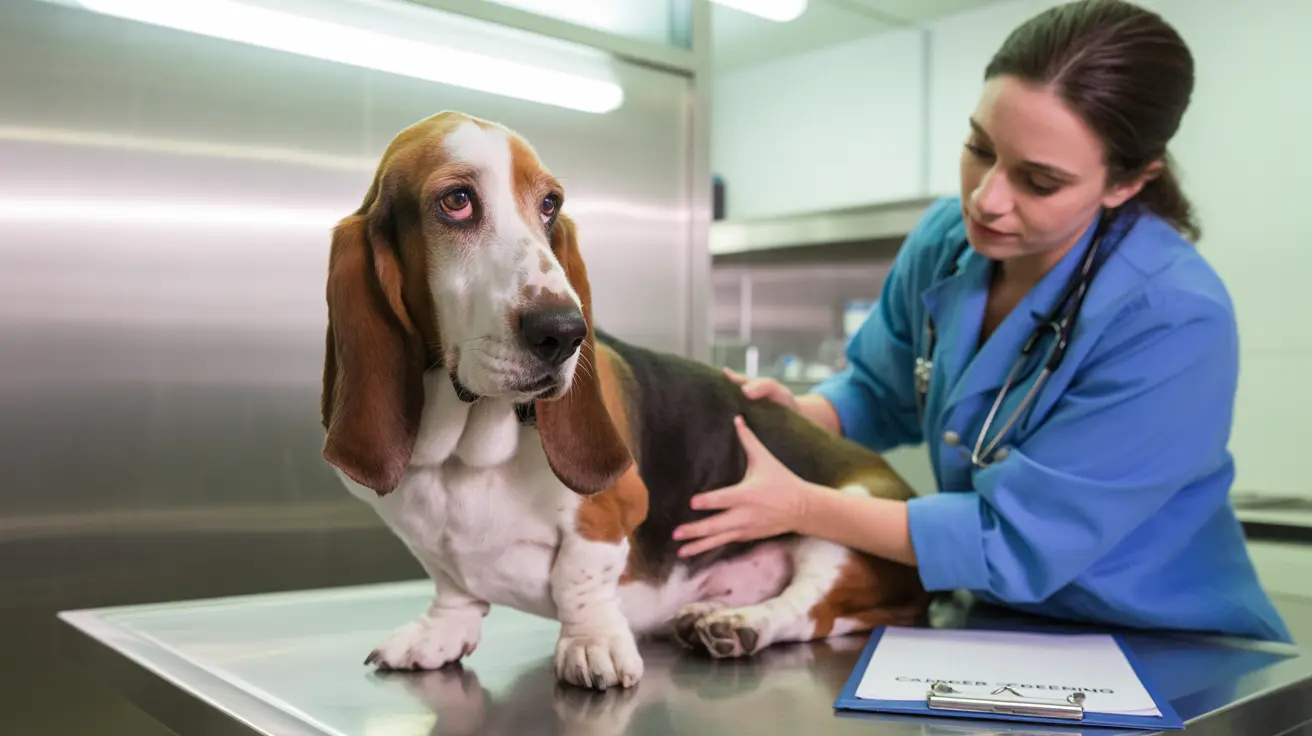Basset Hounds, beloved for their distinctive appearance and gentle temperament, typically live between 10 to 13 years. However, like all breeds, they face specific health challenges that can impact their lifespan. Understanding what Basset Hounds usually die from can help owners provide better preventative care and potentially extend their pet's life.
In this comprehensive guide, we'll explore the primary causes of death in Basset Hounds and discuss ways to help prevent or manage these conditions effectively.
Primary Causes of Death in Basset Hounds
Cancer
Cancer is the leading cause of death in Basset Hounds, accounting for approximately 31% of deaths in the breed. The most common types include lymphoma and squamous cell carcinoma. Lymphoma typically affects the lymphatic system, while squamous cell carcinoma often manifests as skin tumors that can be difficult to detect due to the breed's characteristic skin folds.
Gastric Dilatation-Volvulus (Bloat)
Bloat is a life-threatening condition responsible for about 11% of Basset Hound deaths. Due to their deep-chested structure, Bassets are particularly susceptible to this condition, where the stomach distends and twists. This emergency situation requires immediate veterinary intervention to prevent death.
Cardiac Disease
Heart conditions, particularly dilated cardiomyopathy, account for roughly 8% of Basset Hound deaths. This condition causes the heart to enlarge and weaken, ultimately leading to heart failure if left untreated.
Preventative Measures and Health Management
Regular Health Screenings
Early detection is crucial for managing potentially fatal conditions. Regular veterinary check-ups should include:
- Cardiac evaluations
- Cancer screenings
- Blood work
- Joint assessments
Lifestyle Management
Proper lifestyle management can significantly reduce the risk of several fatal conditions:
- Feed smaller, more frequent meals to prevent bloat
- Maintain a healthy weight through regular exercise
- Keep skin folds clean and dry
- Schedule regular ear cleanings
- Monitor for unusual lumps or behavioral changes
Understanding Genetic Predispositions
Basset Hounds have several genetic factors that influence their health outcomes. Their characteristic body structure, while endearing, can contribute to various health issues. Understanding these predispositions helps owners provide more targeted preventative care.
Quality of Life Considerations
While understanding mortality causes is important, maintaining a good quality of life is equally crucial. This includes:
- Appropriate exercise tailored to their physical capabilities
- Mental stimulation through gentle activities
- Regular social interaction
- Comfortable living conditions that accommodate their physical needs
Frequently Asked Questions
What are the most common causes of death in Basset Hounds?
The leading causes of death in Basset Hounds are cancer (31%), old age (13%), bloat/GDV (11%), and cardiac disease (8%). Cancer, particularly lymphoma and squamous cell carcinoma, represents the highest mortality risk for the breed.
How does cancer affect Basset Hounds and what types are most prevalent?
Cancer affects Basset Hounds primarily through lymphoma and squamous cell carcinoma. Lymphoma targets the lymphatic system, while squamous cell carcinoma typically presents as skin tumors. Early detection through regular veterinary screenings is crucial for successful treatment.
Why are Basset Hounds prone to gastric dilatation-volvulus (bloat) and how can it be prevented?
Basset Hounds are prone to bloat due to their deep-chested anatomy. Prevention includes feeding smaller meals throughout the day, avoiding exercise immediately after meals, and using slow-feed bowls. Recognizing early symptoms like restlessness and a distended abdomen is crucial for survival.
What heart conditions are Basset Hounds likely to develop and what are the signs?
Dilated cardiomyopathy is the most common heart condition in Basset Hounds. Signs include coughing, fatigue, exercise intolerance, and fainting. Regular cardiac screenings can help detect these conditions early.
How can I help my Basset Hound live longer and avoid common health problems?
To maximize your Basset Hound's lifespan, maintain regular veterinary check-ups, provide appropriate exercise, manage weight, keep skin folds clean, and watch for early signs of common health issues. A balanced diet and preventative care are essential for longevity.
Understanding what typically causes death in Basset Hounds empowers owners to make informed decisions about their pet's health care. While these health challenges can be serious, proper preventative care and early intervention can help ensure a longer, healthier life for these beloved dogs.






